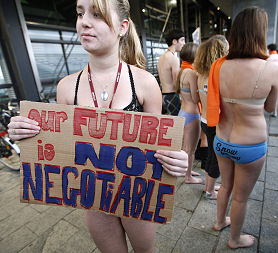Is a bad climate deal better than no deal?
Updated on 11 December 2009
As tempers boil in Copenhagen, the delegates edge towards a more radical compromise. But is it yet a good enough deal to prevent developing states from walking out? Julian Rush reports.

The first tentative signs of international agreements over how to tackle climate change emerged in Copenhagen today.
At the same time the summit got its first taste of climate activists turning physical and being arrested after disrupting meetings.
The EU is to stump up £6.5bn over the next three years to help developing nations and Britain is the biggest donor, committing up to £1.5bn of that total.
Climate negotiators are considering a draft agreement to cut the world's carbon emissions.
But as our science correspondent Julian Rush reports from Copenhagen, the text leaves the negotiators as divided as they were before.
Interview: Dr Saleemul Huq
Jon Snow interviewed a key player in the Copenhagen process - Dr Saleemul Huq is a longstanding member of the Intergovernmental Panel on Climate Change, and an advisor to the delegations from the least developed countries including his own, Bangladesh.
Climate plan to 'cut world emissions by half'
It's only a first draft and there's a week of hard bargaining to go but the UN has announced what it wants to form the basis of negotiations in Copenhagen.
A 50 per cent reduction in world greenhouse emissions, with the richer nations cutting by at least 75 per cent.
A draft from the chairman of the one of the main negotiating bodies at the summit says that overall emissions should be reduced by at least 50 per cent by 2050.
But it says richer nations - including Britain and the United States - should go even further, with a cut of between 25 and 40 per cent by 2020 and at least 75 per cent by 2050.





